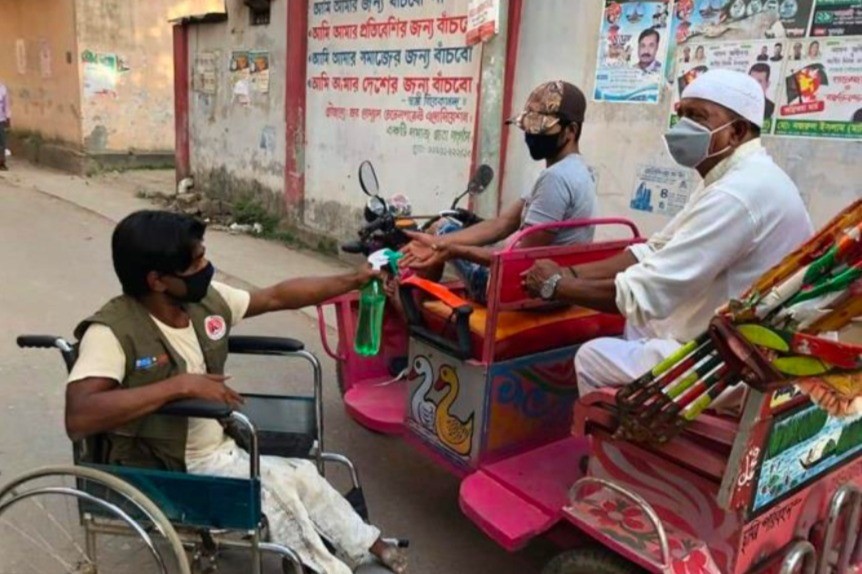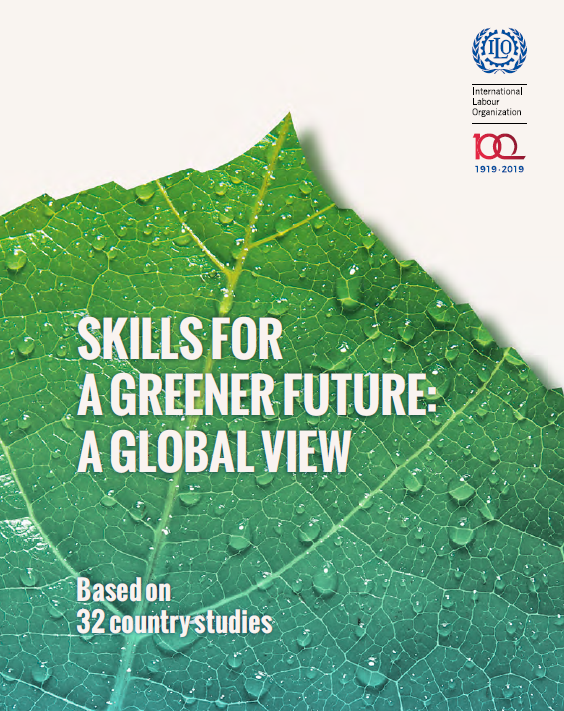Publications
2020
-

COVID-19 and the World of Work: Ensuring the inclusion of persons with disabilities at all stages of the response
05 June 2020
Many persons with disabilities come into the COVID-19 crisis already facing significant exclusion in all areas of the world of work. The pandemic and resulting economic shocks increase the vulnerability of persons with disabilities to further inequalities. The new ILO brief points out what needs to be done to make the socio-economic response inclusive of persons with disabilities and also addresses issues related to containment measures and the long-term recovery.
-

COVID-19 and the World of Work: Ensuring the inclusion of persons with disabilities at all stages of the response
04 June 2020
Many persons with disabilities come into the COVID-19 crisis already facing significant exclusion in all areas of the world of work. The pandemic and resulting economic shocks increase the vulnerability of persons with disabilities to further inequalities. The new ILO brief points out what needs to be done to make the socio-economic response inclusive of persons with disabilities and also addresses issues related to containment measures and the long-term recovery.
-
Guidelines for recognition of prior learning assessment in Tanzania
14 May 2020
-
Tracer Study to examine employment outcomes of B-SEP supported TVET Graduates, Micro-entrepreneurs and Apprentices
14 May 2020
-

© A. Fiorente 2024
Key issues on promoting employment of persons with disabilities
15 April 2020
This document brings together the technical advice of the disability team at the Gender, Equality and Diversity branch (GED) in the ILO. The information in this document is pragmatic guidance, rather than statement of institutional position. ILO positions can be found in the statements and standards that are linked to throughout. Given the complex and changing nature of many of these issues addressed in this document, the intention is to update it on a regular basis.
-

Disability-inclusive Social Protection response to COVID-19 crisis
09 April 2020
This brief presents several elements that can help make the most of the social protection systems response to COVID-19 to support persons with disabilities.
-

Lifelong Learning in the Informal Economy: A Literature Review
08 April 2020
This literature review aims to provide an update to current debates on how to bridge the gap for informal economy workers to access and participate in relevant and quality skills development and recognition throughout their lives, identifies research gaps and provides recommendations for future programming.
-

Persons with disabilities in the COVID-19 response
08 April 2020
The COVID-19 crisis is new. It is requiring us all to act, interact and communicate in different ways than we are used to. However, the social inequalities exacerbating COVID-19’s impact on persons with disabilities are not new. The risk in the response to the current crisis is that persons with disabilities will be left behind once again. The good news is that we already know what works. Fundamentally, we need social justice, effective inclusion, equality of opportunities and decent work.
2019
-

Promoting Employment Opportunities for People with Disabilities: Quota Schemes (Vol. 2)
23 December 2019
Employment quotas represent one of the most frequently used policy measures to promote work opportunities for persons with disabilities. Slightly over 100 countries around the world currently provide for employment quotas in their national legislation. While some countries have had employment quotas for many decades, others have introduced them recently, revised them or are planning to introduce them. There is no standard approach. Quotas vary from country to country in terms of the level of the percentage obligation, the size of company covered, whether they apply to public and private sector employers, how compliance is monitored and what measures apply in the case of non-compliance.
-

Promoting Employment Opportunities for People with Disabilities: Quota Schemes (Vol. 1)
23 December 2019
Employment quotas represent one of the most frequently used policy measures to promote work opportunities for persons with disabilities. Slightly over 100 countries around the world currently provide for employment quotas in their national legislation. While some countries have had employment quotas for many decades, others have introduced them recently, revised them or are planning to introduce them. There is no standard approach. Quotas vary from country to country in terms of the level of the percentage obligation, the size of company covered, whether they apply to public and private sector employers, how compliance is monitored and what measures apply in the case of non-compliance.
-
Promoting green jobs for youth through national employment policies and programmes
17 December 2019
This Technical Note elaborates on national employment policies as viable entry points to address the questions outlined, for the purpose of guiding policy makers and programme managers in designing effective strategies for green jobs for youth. The note attempts to link conceptual and policy frameworks with promotional measures on the ground. It considers relevant approaches, instruments, and examples of good practice, by using the employment policy framework as a compass.
-
Promoting Youth Employment in Fragile Settings
16 December 2019
This technical note underscores the value of employment-based interventions in situations of fragility, for youth and the broader society. The note presents relevant policy frameworks, as well as operational approaches and tools applied in addressing the need of young women and men exposed to the consequences of conflicts and natural disasters. Drawing on ILO knowledge and country experiences, it offers insights for policy advice and programme making.
-

Good practice guide for the employment of persons with disabilities
16 December 2019
This brochure was prepared by the Serbian Association of Employers and published with the assistance of the International Labour Organization (ILO), under the framework of the United Nations Partnership for the Rights of Persons with Disabilities (UNPRPD project) entitled "Autonomy, Voice and Participation of Persons with Disabilities in Serbia."
-

Skills for a greener future: a global view
12 December 2019
The first global report on the implications of the transition to low-carbon and resource-efficient economies for skills, gender and occupations.
-

Skills for a greener future: Challenges and enabling factors to achieve a just transition
06 December 2019
-
Users' Manual for Planning and Implementing TREE Programs in Pacific Island Countries
06 December 2019
This Pacific adapted version of TREE is intended primarily as a reference guide for those responsible for planning an implementing TREE projects and programs in Pacific Island Countries. It is based on the ILO’s Global TREE methodology and community-based training principles, but has been adapted to reflect the special economic, socio-cultural and environmental conditions of small island developing states in the Pacific.
-

The Future of Work: Trade Unions in Transformation
29 November 2019
It has become harder for trade unions in both developed and emerging countries to protect the rights of workers and working conditions, as shown not only in the reduction of unionization, but also the fall in the labour share of income in most countries.This issue of the Journal compiles the thoughts of leading academics on the topics that are shaping discussions on the future of work. The Journal aims to serve as a stepping stone for the labour movement in its own deliberations on how workers’organizations can react to the fundamental changes that are affecting the world of work, and that it will provide further reflections on the transformation of trade unions these changes might entail.
-
Employment services that work for young people
25 November 2019
-

Making the future of work inclusive of people with disabilities
21 November 2019
In the context of a rapidly changing world, the Future of Work is an issue drawing the attention of many individuals and organizations. It is a global concern, posing important challenges that need to be addressed urgently. One such challenge is how to ensure that the future of work is inclusive, leaving no one behind, including the one billion persons with disabilities living on our planet.
-

Persons with disabilities in a just transition to a low-carbon economy
06 November 2019
Implementing a just transition that ensures disability inclusion will require appropriate legal standards, social protection mechanisms, skills development initiatives and attitudinal changes at the societal level.